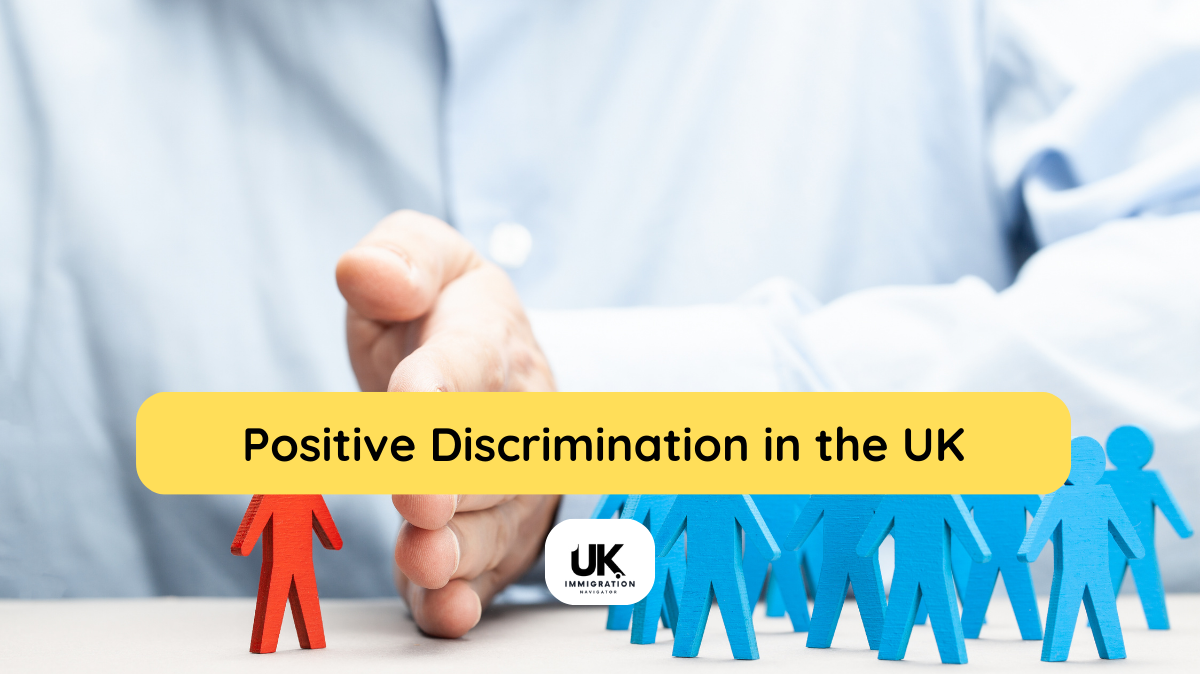Welcome to UK Immigration Navigator! In this article, we’ll explore the concept of positive discrimination in the UK, its legal boundaries, and how it differs from lawful initiatives like positive action. With a focus on 2025 updates, we’ll clarify myths, highlight risks, and explain how employers can promote diversity without breaking the law. Let’s dive in!
What is Positive Discrimination?
Positive discrimination refers to favoring individuals from underrepresented groups (e.g., based on race, gender, or disability) to address historical inequalities. While well-intentioned, it often involves preferential treatment solely based on protected characteristics, which is illegal under UK law.
Example of Positive Discrimination:
Rejecting a qualified male candidate for a role to hire a less qualified female candidate because the company wants to improve gender balance.
Table of Contents
Positive Discrimination vs. Positive Action: Key Differences
| Aspect | Positive Discrimination | Positive Action |
|---|---|---|
| Legality in the UK | Illegal under Equality Act 2010 | Legal if criteria are met |
| Basis of Decision | Protected characteristic alone | Merit + steps to support underrepresentation |
| Example | Hiring someone only due to ethnicity | Providing mentorship to minority applicants |
Key Law: The Equality Act 2010 prohibits discrimination but allows positive action to address disadvantages (Sections 158-159).
Is Positive Discrimination Ever Legal in the UK?
In very limited cases, exceptions apply:
- Occupational Requirements: Roles where a protected characteristic is essential (e.g., hiring a female counselor for a women’s shelter).
- Tie-Breaker Scenarios: If two candidates are equally qualified, employers may choose one from an underrepresented group (Section 159).
2025 Update: No changes to these rules are expected, but awareness of lawful positive action is rising.
Positive Action in 2025: What’s Permitted?
Employers can legally:
- Run targeted internships for underrepresented groups.
- Offer training programs for disabled employees.
- Advertise jobs in forums frequented by minority communities.
Prohibited Actions:
- Setting rigid diversity quotas.
- Lowering entry requirements for specific groups.
Risks of Unlawful Positive Discrimination
| Consequence | Details |
|---|---|
| Employment Tribunal Claims | Fines up to £184,000 (uncapped for injury to feelings) |
| Reputational Damage | Negative media coverage and loss of public trust |
| Loss of Talent | Qualified candidates may avoid applying due to perceived unfair practices |
Case Study: In 2023, a UK council faced backlash for reserving roles for ethnic minorities, leading to legal challenges.
Best Practices for Employers in 2025
- Focus on Positive Action:
- Use anonymized CVs to reduce unconscious bias.
- Partner with diversity-focused recruitment agencies.
- Transparent Policies:
- Document decisions to prove compliance with the Equality Act.
- Training:
- Educate HR teams on lawful vs. unlawful practices.
FAQs About Positive Discrimination in the UK
Q1: Can employers set diversity targets?
Yes, but targets (aspirational goals) are legal. Quotas (rigid requirements) are not.
Q2: Is all positive discrimination illegal?
Yes, unless it meets strict occupational requirements or tie-breaker rules.
Q3: How can companies improve diversity legally?
Use positive action: mentorship, outreach, and unbiased recruitment tools.
Q4: What’s the penalty for unlawful positive discrimination?
Unlimited compensation awards in tribunals and reputational harm.
Q5: Are scholarships for minority groups legal?
Yes, if they aim to address disadvantage and are open to all eligible candidates.
Key Takeaways for 2025
- Positive Discrimination ≠ Positive Action: Know the legal difference.
- Merit Matters: Hiring/promotion must prioritize skills and experience.
- Stay Informed: Monitor EHRC guidelines for updates on diversity initiatives.
- Document Everything: Protect your organization from tribunal claims.
Need help navigating UK employment law? Visit the Equality and Human Rights Commission or consult a legal expert. For more guides on visas or workplace compliance, explore UK Immigration Navigator!
